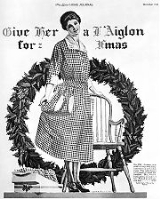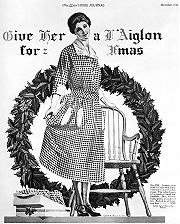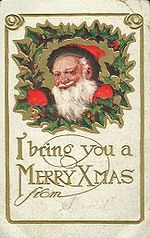
Xmas
Encyclopedia

Christmas
Christmas or Christmas Day is an annual holiday generally celebrated on December 25 by billions of people around the world. It is a Christian feast that commemorates the birth of Jesus Christ, liturgically closing the Advent season and initiating the season of Christmastide, which lasts twelve days...
". It is sometimes pronounced ˈ, but it, and variants such as "Xtemass", originated as handwriting abbreviations for the typical pronunciation ˈ. The "-mas" part is from the Latin-derived Old English word for "Mass
Mass (liturgy)
"Mass" is one of the names by which the sacrament of the Eucharist is called in the Roman Catholic Church: others are "Eucharist", the "Lord's Supper", the "Breaking of Bread", the "Eucharistic assembly ", the "memorial of the Lord's Passion and Resurrection", the "Holy Sacrifice", the "Holy and...
", while the "X" comes from the Greek
Greek alphabet
The Greek alphabet is the script that has been used to write the Greek language since at least 730 BC . The alphabet in its classical and modern form consists of 24 letters ordered in sequence from alpha to omega...
letter Chi
Chi (letter)
Chi is the 22nd letter of the Greek alphabet, pronounced as in English.-Greek:-Ancient Greek:Its value in Ancient Greek was an aspirated velar stop .-Koine Greek:...
, which is the first letter of the Greek word Χριστός, translated as "Christ
Christ
Christ is the English term for the Greek meaning "the anointed one". It is a translation of the Hebrew , usually transliterated into English as Messiah or Mashiach...
".
There is a common misconception that the word Xmas is a secular attempt to remove the religious tradition from Christmas by taking the "Christ" out of "Christmas".
Style guides and etiquette

Style guide
A style guide or style manual is a set of standards for the writing and design of documents, either for general use or for a specific publication, organization or field...
s, including those at the New York Times, The Times
The Times
The Times is a British daily national newspaper, first published in London in 1785 under the title The Daily Universal Register . The Times and its sister paper The Sunday Times are published by Times Newspapers Limited, a subsidiary since 1981 of News International...
, The Guardian
The Guardian
The Guardian, formerly known as The Manchester Guardian , is a British national daily newspaper in the Berliner format...
, and the BBC
BBC
The British Broadcasting Corporation is a British public service broadcaster. Its headquarters is at Broadcasting House in the City of Westminster, London. It is the largest broadcaster in the world, with about 23,000 staff...
. Millicent Fenwick
Millicent Fenwick
Millicent Hammond Fenwick was an American fashion editor, politician and diplomat. A four-term Republican member of the United States House of Representatives from New Jersey, she entered politics late in life and was renowned for her energy and colorful enthusiasm...
, in the 1948 Vogue's Book of Etiquette states that "'Xmas' should never be used" in greeting cards. The Cambridge Guide to Australian English Usage states that the spelling should be considered informal and restricted to contexts where concision is valued, such as headlines and greeting cards. The Christian Writer's Manual of Style, while acknowledging the ancient and respectful use of "Xmas" in the past, states that the spelling should never be used in formal writing.
Usage in English
Early use of "Xmas" includes Bernard Ward's History of St. Edmund's college, Old Hall (originally published circa 1755). An earlier version, "X'temmas", dates to 1551. Around 1100 the term was written as "Xp̄es mæsse" in the Anglo-Saxon ChronicleAnglo-Saxon Chronicle
The Anglo-Saxon Chronicle is a collection of annals in Old English chronicling the history of the Anglo-Saxons. The original manuscript of the Chronicle was created late in the 9th century, probably in Wessex, during the reign of Alfred the Great...
. "Xmas" is found in a letter from George Woodward
George Woodward (diplomat)
George Woodward was a British diplomat in Poland during the early 18th century.-External links:*...
in 1753. Lord Byron used the term in 1811, as did Samuel Coleridge (1801) and Lewis Carroll
Lewis Carroll
Charles Lutwidge Dodgson , better known by the pseudonym Lewis Carroll , was an English author, mathematician, logician, Anglican deacon and photographer. His most famous writings are Alice's Adventures in Wonderland and its sequel Through the Looking-Glass, as well as the poems "The Hunting of the...
(1864). In the United States, Oliver Wendell Holmes, Jr.
Oliver Wendell Holmes, Jr.
Oliver Wendell Holmes, Jr. was an American jurist who served as an Associate Justice of the Supreme Court of the United States from 1902 to 1932...
used the term in a letter dated 1923. Since at least the late 19th century, "Xmas" has been in use in various other English-language nations. Quotations with the word can be found in texts written in Canada, and the word has been used in Australia, and in the Caribbean. Merriam-Webster's Dictionary of English Usage stated that modern use of the term is largely limited to advertisements, headlines and banners, where its conciseness is valued. The association with commerce "has done nothing for its reputation", according to the dictionary.
In the United Kingdom, the former Church of England
Church of England
The Church of England is the officially established Christian church in England and the Mother Church of the worldwide Anglican Communion. The church considers itself within the tradition of Western Christianity and dates its formal establishment principally to the mission to England by St...
Bishop of Blackburn
Diocese of Blackburn
The Diocese of Blackburn is a Church of England diocese, covering much of Lancashire, created in 1926 from part of the Diocese of Manchester. The Diocese includes the towns of Blackburn, Blackpool, Burnley, and the cities of Lancaster, and Preston, as well as a large part of the Ribble Valley...
, Alan Chesters
Alan Chesters (bishop)
Alan David Chesters CBE was the Bishop of Blackburn from 1989 to 2003.-Early life and education:Chesters is the son of Herbert and Catherine Chesters, of Huddersfield, West Yorkshire. He was educated at Elland Grammar School, St Chad's College, Durham , St Catherine's Society, Oxford and St...
, recommended to his clergy that they avoid the spelling.
In the United States, in 1977 New Hampshire Governor Meldrim Thomson sent out a press release saying that he wanted journalists to keep the "Christ" in Christmas, and not call it Xmas—which he asserted was a "pagan" spelling of Christmas.
Usage of "X" for "Christ"
- For the article about the "ΧΡ" symbol see Chi RhoChi RhoThe Chi Rho is one of the earliest forms of christogram, and is used by Christians. It is formed by superimposing the first two letters chi and rho of the Greek word "ΧΡΙΣΤΟΣ" =Christ in such a way to produce the monogram ☧...
.

Franklin Graham
William Franklin Graham III , known publicly as Franklin Graham, is an American Christian evangelist and missionary. He is the president and CEO of both the Billy Graham Evangelistic Association and the international Christian relief organization Samaritan's Purse.He currently lives in Boone,...
and CNN
CNN
Cable News Network is a U.S. cable news channel founded in 1980 by Ted Turner. Upon its launch, CNN was the first channel to provide 24-hour television news coverage, and the first all-news television channel in the United States...
journalist Roland S. Martin
Roland S. Martin
Roland Sebastian Martin is an American journalist and syndicated columnist with Creators Syndicate and author of Speak, Brother! A Black Man's View of America, Listening to the Spirit Within: 50 Perspectives on Faith and The First: President Barack Obama's Road to the White House as originally...
. Graham stated in an interview:
for us as Christians, this is one of the most holy of the holidays, the birth of our savior Jesus Christ. And for people to take Christ out of Christmas. They're happy to say merry Xmas. Let's just take Jesus out. And really, I think, a war against the name of Jesus Christ.Martin likewise relates the use of "Xmas" to his growing concerns of increasing commercialization and secularization of one of Christianity's highest holy days. Bratcher posits that those who dislike abbreviating the word are unfamiliar with a long history of Christians using X in place of "Christ" for various purposes.
The word "Christ
Christ
Christ is the English term for the Greek meaning "the anointed one". It is a translation of the Hebrew , usually transliterated into English as Messiah or Mashiach...
" and its compounds, including "Christmas", have been abbreviated in English for at least the past 1,000 years, long before the modern "Xmas" was commonly used. "Christ" was often written as "XP" or "Xt"; there are references in the Anglo-Saxon Chronicle
Anglo-Saxon Chronicle
The Anglo-Saxon Chronicle is a collection of annals in Old English chronicling the history of the Anglo-Saxons. The original manuscript of the Chronicle was created late in the 9th century, probably in Wessex, during the reign of Alfred the Great...
as far back as AD 1021. This X and P arose as the uppercase forms of the Greek letters
Greek alphabet
The Greek alphabet is the script that has been used to write the Greek language since at least 730 BC . The alphabet in its classical and modern form consists of 24 letters ordered in sequence from alpha to omega...
χ
Chi (letter)
Chi is the 22nd letter of the Greek alphabet, pronounced as in English.-Greek:-Ancient Greek:Its value in Ancient Greek was an aspirated velar stop .-Koine Greek:...
and ρ
Rho
Rho is the 17th letter of the Greek alphabet. In the system of Greek numerals, it has a value of 100. It is derived from Semitic resh "head"...
used in ancient abbreviations for Χριστος (Greek for "Christ"), and are still widely seen in many Eastern Orthodox icons depicting Jesus Christ. The labarum
Labarum
The labarum was a vexillum that displayed the "Chi-Rho" symbol ☧, formed from the first two Greek letters of the word "Christ" — Chi and Rho . It was used by the Roman emperor Constantine I...
, an amalgamation of the two Greek letters rendered as ☧
Labarum
The labarum was a vexillum that displayed the "Chi-Rho" symbol ☧, formed from the first two Greek letters of the word "Christ" — Chi and Rho . It was used by the Roman emperor Constantine I...
, is a symbol often used to represent Christ in Catholic, Protestant, and Orthodox
Eastern Orthodox Church
The Orthodox Church, officially called the Orthodox Catholic Church and commonly referred to as the Eastern Orthodox Church, is the second largest Christian denomination in the world, with an estimated 300 million adherents mainly in the countries of Belarus, Bulgaria, Cyprus, Georgia, Greece,...
Christian Churches.
The Oxford English Dictionary
Oxford English Dictionary
The Oxford English Dictionary , published by the Oxford University Press, is the self-styled premier dictionary of the English language. Two fully bound print editions of the OED have been published under its current name, in 1928 and 1989. The first edition was published in twelve volumes , and...
(OED) and the OED Supplement have cited usages of "X-" or "Xp-" for "Christ-" as early as 1485. The terms "Xpian" and "Xtian" have also been used for "Christian". The dictionary further cites usage of "Xtianity" for "Christianity" from 1634. According to Merriam-Webster's Dictionary of English Usage, most of the evidence for these words comes from "educated Englishmen who knew their Greek".
In ancient Christian art, χ and χρ are abbreviations for Christ's name. In many manuscripts of the New Testament
New Testament
The New Testament is the second major division of the Christian biblical canon, the first such division being the much longer Old Testament....
and icon
Icon
An icon is a religious work of art, most commonly a painting, from Eastern Christianity and in certain Eastern Catholic churches...
s, Χ is an abbreviation for Χριστος, as is XC (the first and last letters in Greek, using the lunate sigma); compare IC for Jesus
Jesus
Jesus of Nazareth , commonly referred to as Jesus Christ or simply as Jesus or Christ, is the central figure of Christianity...
in Greek.
Other uses of "X" for "Chris-"
Other proper names containing the name "Christ" besides those mentioned above are sometimes abbreviated similarly (e.g. Xtina for the name "Christina").This usage of "X" to spell the syllable "kris" (rather than the sounds "ks") has extended to "xtal" for "crystal
Crystal
A crystal or crystalline solid is a solid material whose constituent atoms, molecules, or ions are arranged in an orderly repeating pattern extending in all three spatial dimensions. The scientific study of crystals and crystal formation is known as crystallography...
", and on florists' signs to "xant" for "chrysanthemum
Chrysanthemum
Chrysanthemums, often called mums or chrysanths, are of the genus constituting approximately 30 species of perennial flowering plants in the family Asteraceae which is native to Asia and northeastern Europe.-Etymology:...
", even though these words are not etymologically related to "Christ": "crystal" comes from a Greek word meaning "ice", and "chrysanthemum" comes from Greek words meaning "golden flower" (while "Christ" comes from a Greek word meaning "anointed").
In the 17th and 18th centuries, "Xene" and "Exene" were common spellings for the given name Christine. The American singer Christina Aguilera
Christina Aguilera
Christina María Aguilera is an American recording artist and actress. Aguilera first appeared on national television in 1990 as a contestant on the Star Search program, and went on to star in Disney Channel's television series The Mickey Mouse Club from 1993–1994...
has sometimes gone by the name "Xtina" (the "t" should not be considered redundant; as is noted above, "Christ" was historically often shortened to "Xt", not just to X).
In popular culture
In the animated television show FuturamaFuturama
Futurama is an American animated science fiction sitcom created by Matt Groening and developed by Groening and David X. Cohen for the Fox Broadcasting Company. The series follows the adventures of a late 20th-century New York City pizza delivery boy, Philip J...
, which is set in the 31st century, Xmas ˈ is the official name for the day formerly known as Christmas (which, in the episode "Xmas Story
Xmas Story
"Xmas Story" is the fourth episode in the second production season of Futurama. It originally aired as the eighth episode in the second broadcast season in North America on December 19, 1999. The episode was written by David X. Cohen and directed by Peter Avanzino. John Goodman guest stars in this...
," is said to have become an "archaic pronunciation").
See also
- ChristogramChristogramA Christogram is a monogram or combination of letters that forms an abbreviation for the name of Jesus Christ, traditionally used as a Christian symbol. Different types of Christograms are associated with the various traditions of Christianity, e.g...
- Christmas controversy
- List of common English usage misconceptions
- Names and titles of Jesus
- Robert ChristgauRobert ChristgauRobert Christgau is an American essayist, music journalist, and self-proclaimed "Dean of American Rock Critics".One of the earliest professional rock critics, Christgau is known for his terse capsule reviews, published since 1969 in his Consumer Guide columns...
, Christo , Exene CervenkaExene CervenkaExene Cervenka is an American writer, musician and artist, most famous as the co-lead vocalist of the Los Angeles punk rock band X.-Career:...
and Christina AguileraChristina AguileraChristina María Aguilera is an American recording artist and actress. Aguilera first appeared on national television in 1990 as a contestant on the Star Search program, and went on to star in Disney Channel's television series The Mickey Mouse Club from 1993–1994...
for other uses of an X prefix abbreviation.
External links
- An icon of Christ featuring the abbreviations IC and XC in the upper corners
- "Why get cross about Xmas?" (BBC, December 22, 2004)

